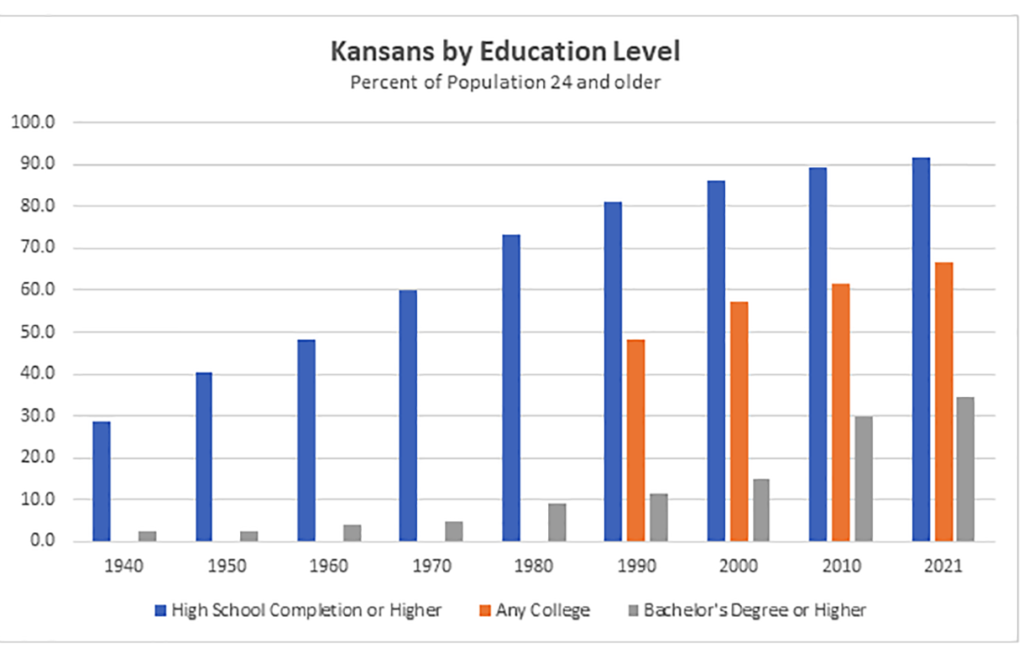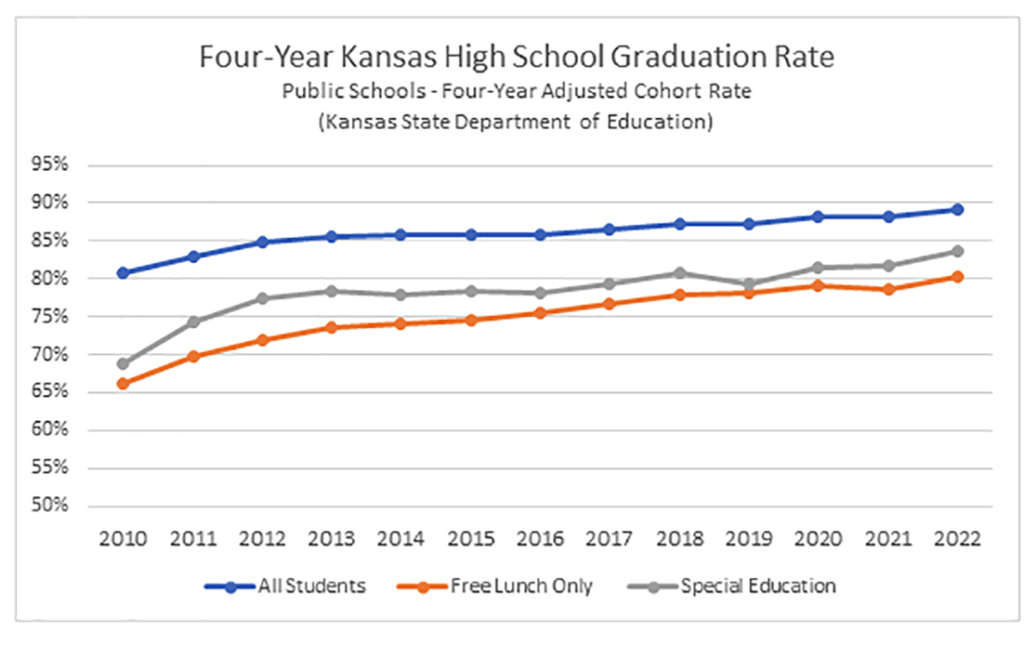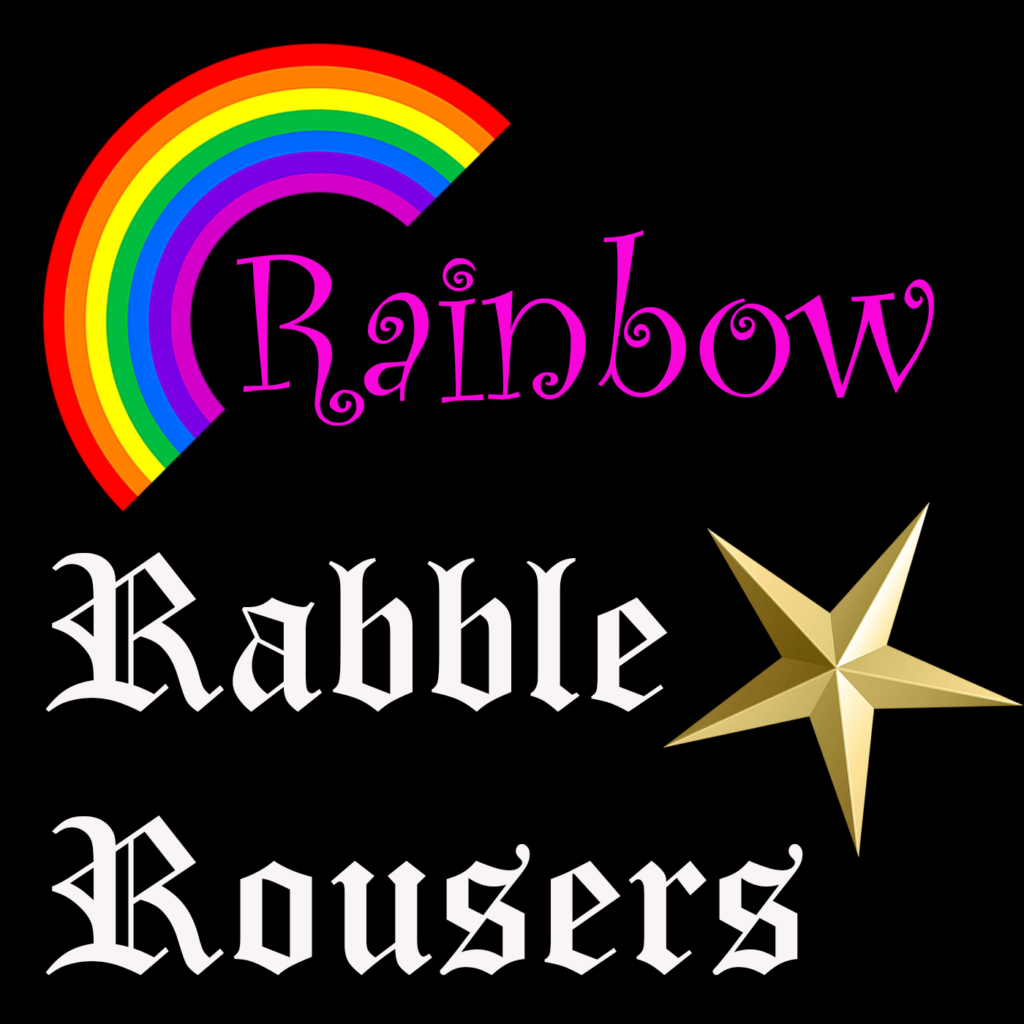Kansas Association of School Boards releases propaganda in time for graduation
Over the weekend high schools and colleges celebrated the graduation of students across Kansas, promising them a successful career now that they have earned their degree. On Wednesday, May 17, Kansas Association of School Boards (KASB) released an article titled, ‘The Benefits of an Increased Graduation Rate in Kansas.‘
The article starts off, stating that despite the pandemic, a record number of Kansans are graduating, and provides a chart to show the rising percentage of graduates.
“Despite the impact of the COVID pandemic, the U.S. Census reports that in 2021, Kansans 24 and older who had completed high school reached 91.9 percent of the population, those with any college education reached 66.5 percent, and those with a four-year degree or higher reached 34.8 percentage – all higher than the pre-pandemic year of 2019 and each number an all-time high in Kansas history.”

The article goes on to infer that because graduation rates are rising, it is unnecessary for people to worry about the Kansas education system failing students. They continue by stating that if future kids want to be successful, they will have to get some form of higher education.
“In the 1970s, about two-thirds of jobs required only a high school diploma or less. Today, two-thirds of jobs require more than a high school diploma, and those demands are only expected to increase.”
The article goes on to ask the question of whether the completion rate is due to grade inflation and lower standards. However, it doesn’t answer this question, opting to instead point out that in 2021, those with a graduate degree earned 117 percent more than those without a high school diploma. They further claimed that in 2021, those without a high school degree had a 20 percent poverty rate, while those with a four-year degree had a 1.9 percent poverty rate.
Some interesting statistics that were not in the article, but should be noted include:
- Less than a third of Kansas students read proficiently, according to the 2022 National Assessment for Educational Progress (NAEP).
- Only 21% of Kansas graduates who took the 2022 ACT were college-ready in English, Reading, Math and Science.
- The 2022 state assessment shows Kansas has more students below grade level than are proficient.
Without linking any studies, they then claimed that based on current earnings by education level, Kansans in 2021 earned $8.5 billion dollars more than they would have at 1990 education levels and poverty was reduced by about 20 percent. According to Statista, the median household income in 1990s Kansas was $29,917 while in 2021 it was $75,979. Due to inflation, the 2021 dollar amount is reduced to $36,647.78 when put at the 1990 dollar value–an increase of $6,730.78.
They do look at data from a U.S. census report, though it’s not clear if this report was specific to Kansas or not.
“According to a 2020 U.S. Census report, the median household wealth for a family whose highest educational attainment is less than high school is less than $5,000. Suppose the highest educational level in the household is high school only. In that case, median wealth jumps to over $40,000, rising to $72,000 for some college and $116,000 for a two-year degree, $233,000 for a four-year degree, and nearly $460,000 for a graduate degree.”
They go onto claim Kansans are reaping the benefits of higher incomes and financial security “because schools are graduating more students, and more students will earn higher-skill credentials.” They provide a graph showing the increase in four-year government high school graduation rates from 2010 to 2022.

The last bit of significant statistics that they end with states,
“Although public school enrollment has increased by only about three percent over the last 20 years, since 2009, the number of high school graduates has increased by 11 percent, and the number of postsecondary credentials awarded to students under age 24 by Kansas colleges and universities increased by 34 percent. That increase has been boosted by the number of students earning credentials while still in high school through dual and concurrent enrollment programs with colleges. Since 2009, the number of credentials earned by students under age 19 has increased by 128 percent, from 2,494 to 5,590 – meaning about one in six high school graduates have earned a college degree or certificate at the same time they receive a high school diploma.”
They do note that these credentials don’t include specific things that are necessary for employment after high school such as “industry-recognized credentials and certificates for workplace skills, work-based learning like internship and job shadowing, earning credit through high school career pathways and developing skills through clubs, activities and projects.”
Furthermore, something they don’t acknowledge throughout the entirety of their article is the growing issue of the student loan debt crisis. When it comes to student loan debt, an Investopedia article on the 2022 statistics and outlook highlighted the following key takeaways:
- The total amount of outstanding student loan debt in the United States is $1.76 trillion.
- Soaring college costs and pressure to compete in the job marketplace are big factors for student loan debt.
- Student loans are the most common form of educational debt, followed by credit cards and other types of credit.
- Delinquency statistics may be understated because of the relief provided to student loan borrowers by the White House.
- Borrowers who don’t complete their degrees are more likely to default.
One of the last eyebrow-raising claims made in the article is the idea that the State Board of Education’s Kansas Can vision includes their work for “stronger ties with parents” when they have actively opposed the Parents’ Bill of Rights which would allow greater transparency in government schools so parents would know more about what government schools were doing with their children.
Thanks for reading. Be sure to share and subscribe. You can also help support independent journalism in Kansas by buying me a coffee at buymeacoffee.com/kscon.

Ian Brannan
Ian Brannan is an independent journalist who founded The Kansas Constitutional in April 2022. His work focuses on issues including abortion, Convention of States, drug policy, education, government, LGBT issues, media, and more. He is also the co-host of the Rainbow Rabble-Rousers podcast.

